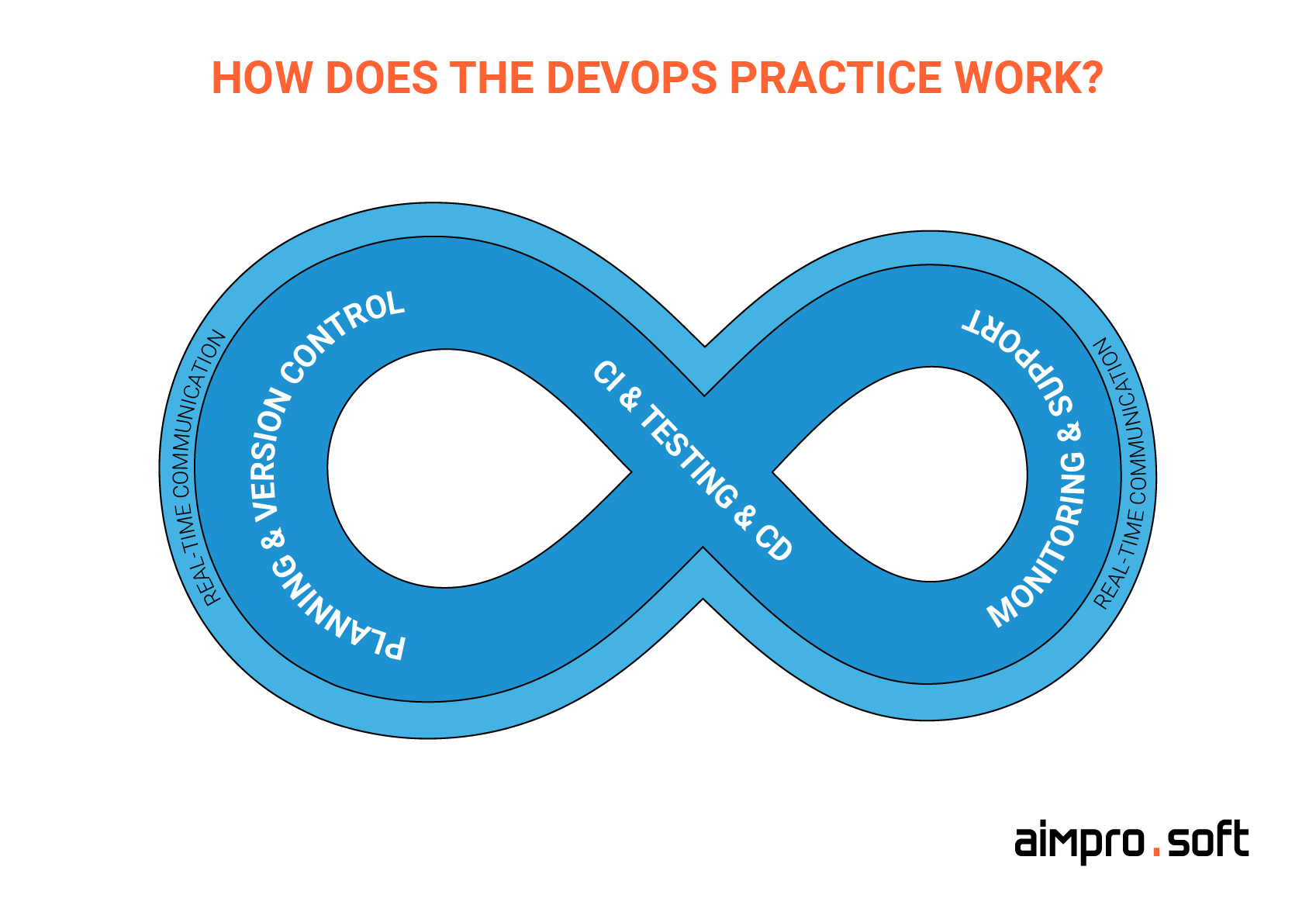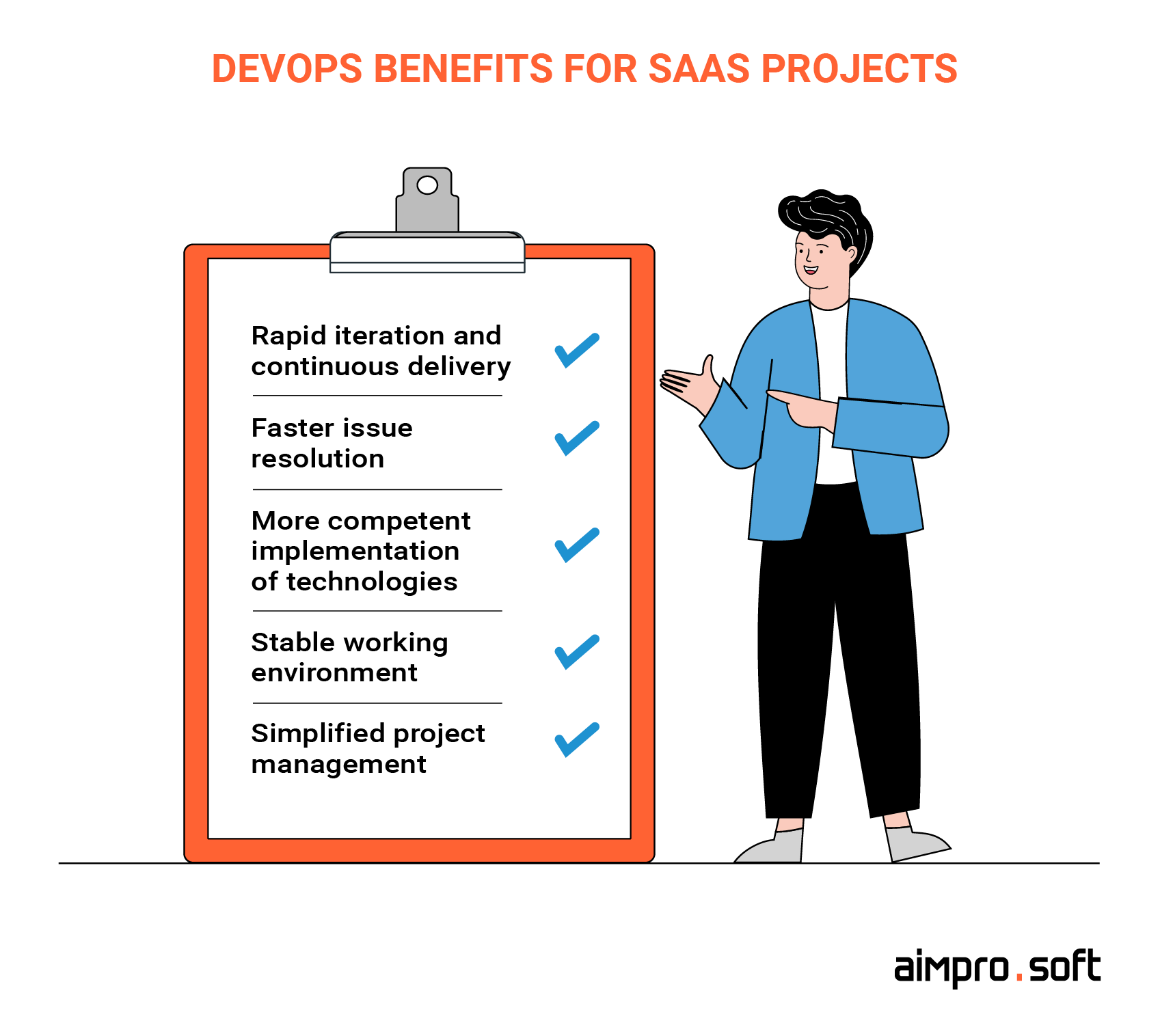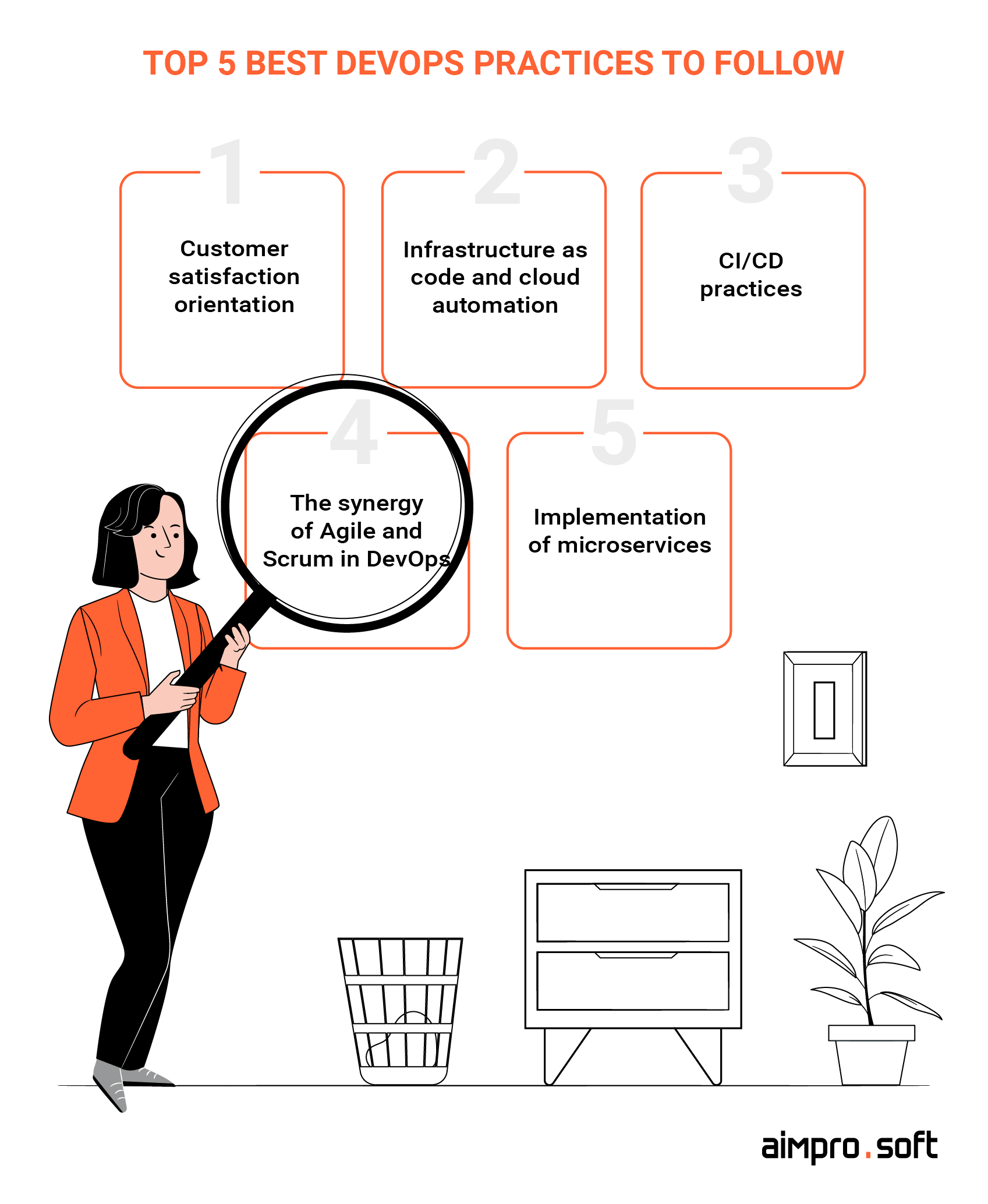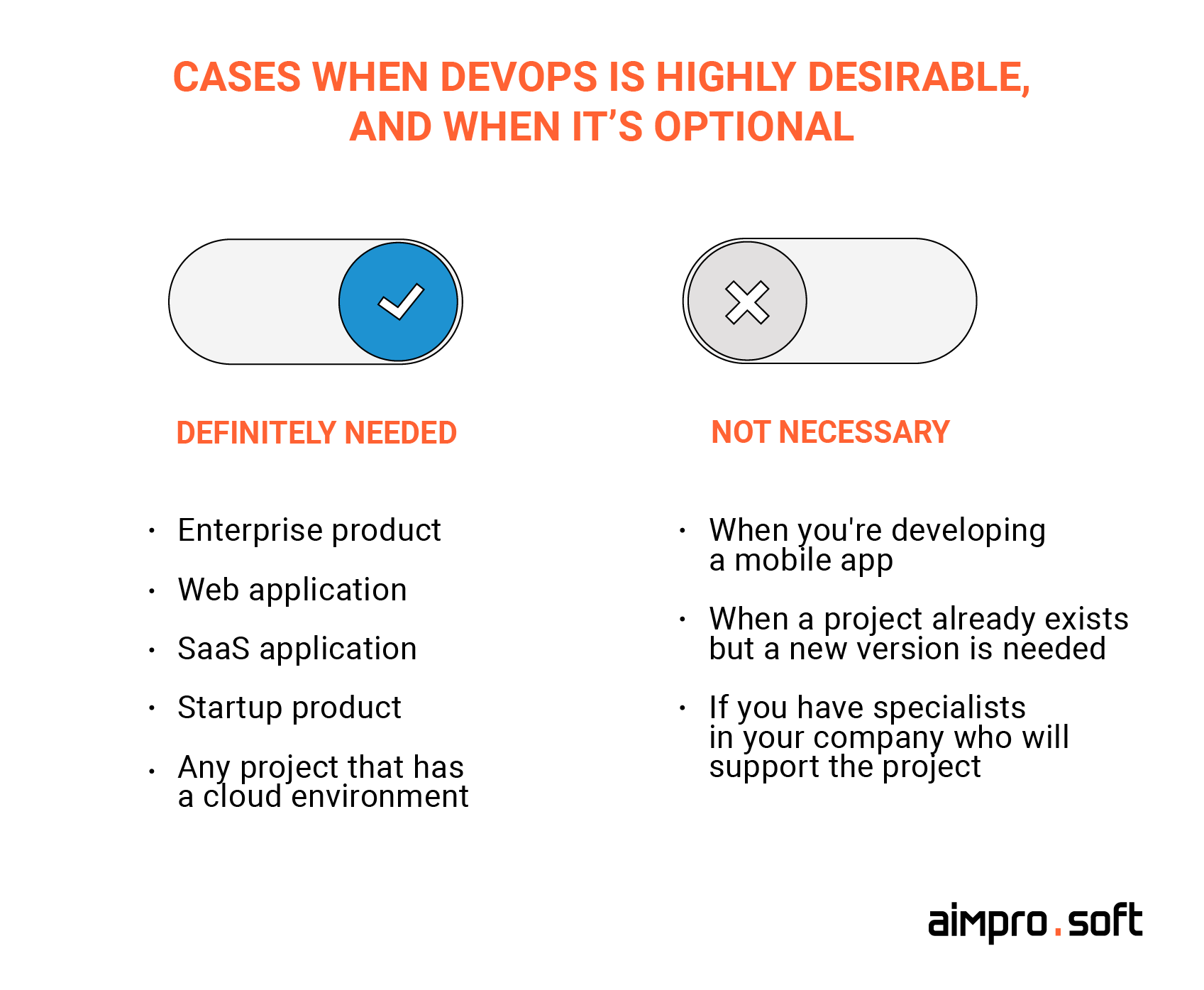DevOps for SaaS Projects in 2024

Key takeaways
- Get an in-depth understanding of what DevOps practice is and find out the latest trends in DevOps to watch out for in 2023 and stay ahead of competitors.
- Learn about the benefits of the DevOps approach and how it can positively affect the security and scalability of your product and facilitate proactive incident response.
- Discover the top DevOps best practices that we recommend using to improve all phases of development.
- Find out how you can take DevOps practices to the highest level when creating your SaaS projects.
- DevOps is a must-have practice for the majority of projects. However, it’s still not a one-size-fits-all solution. Find out when you need DevOps and when it’s optional.
Business owners strive for excellence in software development, but the path to success is complicated since it presupposes the correct choice of best practices and technologies that are planned to be integrated. DevOps is becoming the catalyst for agility, quality, and security. It combines creativity with efficiency, changing how products are built and delivered. In this article, we will explore DevOps by deciphering its essence, exploring its application, and uncovering the strategic mastery that leads projects to success. We’ll look at the core principles of this approach, the benefits of DevOps for SaaS projects, best practices, and implementation scenarios.
What is DevOps? Essence and future trends that are worth following
The SaaS model is gaining popularity in today’s world due to its rapid deployment, cost-efficiency, accessibility, and scalable application environment. According to Statista research, the SaaS market is estimated to be worth around $197 billion in 2023.
However, SaaS solutions demand effective technologies and practices due to their unique characteristics like scalability, distributed architecture, and multi-tenancy to ensure their seamless development. Therefore, many businesses integrate DevOps into the development process to make sure that the creation of SaaS solutions goes faster and smoother without crossing deadlines. Thus, let’s talk more about the DevOps methodology to examine better its specifics and actual benefits.
What is the DevOps methodology, and how does it affect the development process?
The DevOps approach to development is a set of practices that bring all software developers and IT operations team members together to work collaboratively throughout the software development lifecycle.

How does the DevOps practice work?
Not only development and operations can be integrated into the DevOps model but so can quality assurance (QAOps) and security (DevSecOps). By proper integration of this practice, you can prevent common development problems from the early stages of development, reducing the likelihood of bugs and improving the overall quality of the software. Ultimately, DevOps fosters a culture of continuous improvement, where teams continually learn from their experiences and use that knowledge to streamline SDLC.
Key practices the DevOps approach includes:
- Continuous Integration (CI): The process of frequently merging code changes into a common repository, providing automatic testing of each change for early detection of problems.
- Continuous Delivery (CD): An extension of CI that provides automatic deployment of code to a production or temporary environment after passing automated tests.
- Automated Testing: The practice of using testing tools to automate the execution of tests to ensure higher software quality and reduce the need for manual testing.
- Continuous Deployment: Automates the entire release process, moving code changes into production after passing automated tests.
- Monitoring and logging: Helps continuously monitor applications and infrastructure to detect and respond to problems proactively.
- Version Control: Practice of using version control systems to track code changes and collaborate effectively.
DevOps trends in 2023
The global DevOps market is known to grow from $8.88 billion in 2022 to $10.84 billion in 2023. As this approach grows in popularity, new practices and trends are emerging. Following these trends is becoming critical for organizations looking to optimize their software development and delivery practices. Let’s look at the latest trends changing the approach to building, deploying, and orchestrating software solutions together.
GitOps
GitOps is a framework that brings the benefits of version control to operations and infrastructure management. Teams can automate deployments, rollbacks, and updates by representing infrastructure and application configurations as code in version-controlled repositories. This approach enhances collaboration, reduces manual intervention, and ensures consistent and auditable deployments, making it a popular choice for organizations seeking streamlined and reliable delivery processes.
Serverless and Function-as-a-Service (FaaS)
As cloud platforms are becoming more mature, serverless computing and FaaS have been gaining increased traction. With serverless, developers can focus solely on writing code, leaving infrastructure management to the cloud provider. By following this trend, companies can improve scalability, reduce costs, eliminate the need to provision and manage servers, and accelerate application time-to-market.
Multi-cloud
Multi-cloud deployment is a rising trend where businesses use various cloud providers for distinct software and infrastructure needs. This strategy delivers benefits such as enhanced application performance, cost reduction, and greater flexibility. Currently, 95% of CIOs choose a multi-cloud strategy because this method helps protect network data and assets from threats by consolidating security measures across multiple cloud deployments.
A key advantage of this strategy is enabling DevOps teams to optimize environments for each workload, granting them flexibility and control. Additionally, it bolsters resilience by reducing reliance on a single vendor, guarding against service disruptions if one cloud experiences issues.
DevSecOps
Thanks to the DevSecOps approach, vulnerabilities can be reduced before the code is delivered to production by doing automated security scans at each level of the development process. This improves security and saves money because problems are often less expensive to resolve early on. As many as 42% of teams regularly employ DevSecOps strategies to decrease risks. This approach is closely related to DevOps, which likewise relies on version control and CI/CD.
Kubernetes
Kubernetes has emerged as the de facto standard for container orchestration, enabling containerized applications’ deployment, scaling, and management. Its compatibility with cloud-native principles, such as microservices and containerization, has driven its adoption. According to studies, about 85% of container orchestration users boosted their productivity thanks its features such as source control, automatic scalability, and the ability to reuse code across systems.
AIOps
AIOps, or artificial intelligence for IT operations, is a revolutionary fusion of artificial intelligence and DevOps practices. At its core, AIOps harnesses the power of advanced algorithms and machine learning to improve the efficiency of IT operations by automating tasks, predicting potential problems, and providing actionable recommendations.
The benefits of AIOps are manifold. First and foremost, it significantly reduces the burden associated with manual monitoring of issues and troubleshooting. By automating routine tasks, AIOps allow IT teams to focus on strategic initiatives and proactive problem-solving. In addition, predictive analytics keeps systems highly available, minimizing downtime and associated costs. That’s why 48% of IT executives hope to improve service levels and organizational performance with AIOps.
These trends represent a dynamic set of tools for organizations looking to streamline their software development and delivery processes. While there are many benefits to following current trends and adopting the latest technologies and practices, unthinkingly following every popular trend can lead to negative consequences. Among the reasons are unprepared infrastructure and inappropriate technologies for the specifics of your product. Therefore, we recommend engaging a DevOps technical consultant to analyze and determine the best solution for your needs.
Now that you have an overview of top DevOps trends to consider for your solution, let’s take a look at the pros of DevOps for SaaS project, finding out how this business method can positively impact a SaaS solution’s development and release processes.
The benefits of DevOps for SaaS projects
Understanding the critical role of DevOps is essential for entrepreneurs looking to optimize the results of their projects. As Forbes experts emphasize, integrating DevOps projects a range of benefits that improve efficiency, quality, and resource allocation. This proactive approach reduces disaster recovery time by 24 times and enhances the quality of results, saving 22% of unplanned work time. And that’s only part of the benefits the practice brings to the SaaS project. In this part, we will look at all of these benefits in detail.

Top DevOps benefits for SaaS projects
Rapid iteration and continuous delivery
Unquestionably, one of the most significant advantages of the DevOps strategy is the ability to create new systems more successfully by incorporating feedback from engineers, team members, and other important parties. DevOps for SaaS thrives on constant innovation. DevOps’ embrace of continuous integration and continuous delivery (CI/CD) ensures that updates and new features reach users swiftly and reliably. This agility is a cornerstone of SaaS success, allowing businesses to iterate quickly based on user feedback and market demands.
Faster issue resolution
DevOps accelerates the resolution of issues by embedding proactive measures in the development lifecycle. Continuous monitoring and automated testing work in tandem to detect anomalies and bugs early on. This early detection prevents problems from escalating and expedites their resolution.
More competent implementation of technologies
Integration of cloud systems is the most critical difference between SaaS and other software projects. Therefore, when developing such a product, one or more specialists should know how cloud services work and how to integrate them into one unified structure. That’s why DevOps is so important in SaaS projects. DevOps automates developer workflows and intelligently integrates cloud technologies, significantly increasing the developed product’s quality.
Stable working environment
Are you conscious of the potential disruption that can arise from the introduction of new features, fixes, or upgrades? These changes have the capability to destabilize your entire system, undermining its performance. DevOps, with its emphasis on stability, addresses this issue head-on. Through a refined DevOps feedback loop, cultivate a well-balanced operational environment.
Changes in QA automation, staging server availability, and the division of responsibilities between the operations and development teams can significantly impact project success. DevOps is an integrated approach that provides discipline and order to the workflow, resulting in an improved software development pipeline.
Simplified project management
Integrating DevOps practices breaks down traditional barriers between different software development and operations teams. This cohesive approach fosters collaborative efforts, creating a streamlined project management process. More transparent communication, reduced friction, and shared responsibilities minimize delays and enhance overall project efficiency. DevOps transforms project management into a harmonious endeavor where every phase aligns seamlessly for successful delivery.
Are you interested in DevOps benefits and want to integrate it into your project? Learn more about how to hire DevOps specialists in our guide.
DevOps for SaaS project: top 5 practices overview
As the field of software development evolves, DevOps principles are becoming a guiding light in creating efficient and reliable workflows. In this section, we will examine the main DevOps practices that have become widespread due to their efficiency. These are essential for improving development processes, whether for SaaS projects or others. By studying these practices, you will discover strategies to improve your projects’ efficiency, reliability, and collaborative potential.

Top 5 best DevOps practices to follow
Customer satisfaction orientation
With its customer-centric approach, DevOps ensures that software solutions cater directly to end-user needs. This approach involves obtaining regular feedback, understanding pain points, and rapidly addressing user concerns. By incorporating customer feedback into the development cycle, DevOps ensures that the final product aligns with user expectations. This customer-centric philosophy resonates across project types, as customer satisfaction remains a universal goal.
Infrastructure as code and cloud automation
Infrastructure as code (IaC) allows teams to define and manage infrastructure through code. Cloud automation becomes essential for SaaS projects that often experience fluctuating user demands and variable workloads. The ability to rapidly reallocate resources in response to spikes in user activity or sudden changes in traffic allows SaaS platforms to maintain optimal performance without manual intervention.
CI/CD practices
Continuous Integration (CI) and Continuous Delivery (CD) practices revolutionize software development by automating the process from code creation to deployment. CI involves frequently integrating code changes into a shared repository, followed by automated testing to identify issues early. CD extends this by automating code deployment to production or staging environments. For SaaS projects, CI/CD ensures stable, frequent updates and minimizes downtime, improving both development efficiency and user experience.
The synergy of Agile and Scrum in DevOps
Incorporating Agile and Scrum practices into a DevOps framework creates a powerful synergy that accelerates deployment processes. This integration enables rapid delivery of core features and seamless integration of customer feedback and iterative development cycles. Agile’s emphasis on continuous evaluation provides the ability to respond quickly to changing project dynamics and stakeholder needs.
In addition, applying Scrum within an Agile project management framework allows for better planning, tracking, and measurement of milestone deliverables. This structured approach will enable teams to manage tasks effectively, adapt to changing requirements, and maintain a transparent workflow.
Making microservices the standard architecture for SaaS
While the monolith architecture remains a preferred choice for various enterprise solutions, the significance of microservices architecture becomes pronounced in the realm of SaaS DevOps products. The approaches of monolithic and microservices architectures exhibit marked differences. The loosely coupled nature of microservices expedites the growth of potentially extensive products, achieving scalability objectives while optimizing resource utilization and minimizing service interruptions.
In the context of SaaS systems, the shift from monoliths to microservices is not just a trend but an inevitable evolution. These SaaS products cater to a vast user base, where downtime is unacceptable. Hence, the imperatives encompass straightforward scalability, robust support for multiregional operations, and integrating multi-currency payment systems.
So we have reviewed the best practices often applied while integrating the DevOps approach to a SaaS project. These practices can significantly modernize and speed up the development process, and you will end up with a product that meets not only your vision but also your customers’ needs.
Set up a consultation with us, and we will find the perfect solution for you.
CONTACT USTips to make DevOps part of your successful SaaS strategy
It’s no secret that the DevOps approach already enhances the whole development process from the very beginning; it improves communication between team members and contributes to faster project implementation. But even in this case, there are methods to improve the DevOps approach itself, and now we will give you an example of some ways that will facilitate the whole development process of your SaaS project.
1. Using the right tools
A crucial facet of refining the DevOps approach involves harnessing tools to streamline processes and amplify collaboration for enhanced project outcomes. One of the main objectives of DevOps is to create a reliable monitoring system to track and prevent potential problems. DevOps can easily integrate such a system into platforms such as Slack to quickly alert the entire development team. This real-time communication minimizes downtime and facilitates proactive responses.
Let’s also take a look at a list of useful tools and their main features:
- Jenkins: an automation server for continuous integration and delivery that automates build, test, and deployment to ensure stable and reliable releases.
- Docker: Simplifies application deployment through containerization, ensuring consistency across environments and speeding up development cycles.
- GitLab: A versatile platform for version control, continuous integration, and collaboration that enables efficient code management.
- Jira: A robust project management tool for planning, tracking, and releasing software.
2. Integration of cloud services into the process
Integrating cloud services such as Amazon CloudWatch, Azure, and AWS is a strategic move that improves DevOps efficiency. These tools provide proactive monitoring of cloud environments, reducing developers’ time troubleshooting issues. By quickly identifying problem areas, these cloud solutions accelerate the path from detection to resolution, ultimately improving project productivity and quality.
The bottom line lies in their accuracy. In line with DevOps principles, these tools enable real-time monitoring of emerging failures. When problems arise, they guide developers straight to the root cause. This shift from investigation to rapid problem-solving not only improves productivity but also the efficiency of the project as a whole.
3. Robust security measures
To begin with, every DevOps specialist is obsessed with complying with all safety regulations, in a good way, of course. For example, each team member will only have access to a specific part of the project, strong passwords will protect the source code, and a very narrow circle of people will have access to it. That’s why having a specialist like DevOps already guarantees the security of your SaaS DevOps product by default.

Also, DevOps applies this “Three Way Principle,” which easily extends to the DevSecOps realm. It means the following:
- Developers commit to preventing known issues or critical security flaws from creeping into downstream operations. This vigilance ensures the holistic success of the entire system.
- Engineers actively shorten the feedback loop by promptly reporting failures, including those related to security. Timely reporting is critical to rapid troubleshooting.
- The organization builds a safety culture by learning from past failures and iteratively addressing and correcting new shortcomings and defects by the principles outlined in the first two methods.
By sticking to the tips that we’ve outlined above, you don’t have to worry about your product’s safety and quick delivery. All of these methods will serve as reliable tools in the development process.
When do you need DevOps? Cases when it’s necessary and when it’s optional
You can often see headlines on the Internet that scream, “When do you need DevOps for a project?” However, in software development, it’s easier to say when you don’t need DevOps. The fact is that in most projects, hiring DevOps is simply a must. Let’s look at different scenarios where you might need DevOps practice or vice versa.

When DevOps is highly recommended and when it is optional
Cases when you definitely need DevOps
Whether you’re working on an enterprise product, a web application, or diving into SaaS, there is one thing in common: the vital role of cloud services. In these scenarios, the need for DevOps is undeniable. DevOps provides security, seamless technology integration, and complete lifecycle control when code and applications reside in the cloud. Moreover, SaaS startups often tread on delicate ground and benefit immensely from DevOps SaaS. It becomes a strategic shield, mitigating risk and ensuring every step is calculated and secure.
Cases when it isn’t necessary to integrate DevOps into a project
When you need to develop a mobile app
In some scenarios, hiring a DevOps specialist may not be appropriate due to the specifics and requirements of the project. One example is mobile app development for well-defined platforms such as iOS or Android. Here, the established norms and methodologies inherent in mobile development optimize the process, making the expansive role of DevOps potentially redundant.
When you already have a finished product and only need to modernize it
For smaller projects aimed at introducing new features or creating updated versions of existing products, DevOps will be redundant. Most often, all workflows are already established on such projects, and developers can cope with the task themselves without DevOps assistance.
If you have the right experts on board
Also, in cases where you already have experienced system administrators and developers in your company, the need for a DevOps specialist can be reduced. Having an experienced administrative team that knows how to manage various aspects of a project is often enough to ensure its smooth operation and longevity.
The most important thing we wanted to convey in this piece is that the DevOps approach is a powerful engine for product development, but it’s not always needed. By taking a smart approach to the decision of how to implement DevOps SaaS in a project and focusing on the needs of your project and company, you will be able to understand exactly whether you need it or not.
Contact us, and we will analyze your project needs and whether you need DevOps.
CONTACT USReasons to hire DevOps specialists at Aimprosoft
With over 18 years of experience in the IT industry, we have successfully implemented over 600 projects, establishing our reputation as a reliable software provider. We have ten years of experience with DevOps practice and profound expertise in SaaS product development using this approach. Aimprosoft is always open to transparent cooperation, and we always pay attention to the needs of our customers. We have a team of experienced DevOps engineers who can create a unique and secure SaaS DevOps product that will meet your vision.
Let’s look closer at what DevOps services we offer and what technologies we have experience with.
Services that our DevOps engineers will provide for your project
- Process automation
Aimprosoft’s DevOps engineers help optimize CI/CD automation, develop scripts, and streamline server clusters.
- Network and storage management
Our DevOps engineers excel in creating dependable, scalable network and storage solutions in data centers or cloud environments.
- Agile virtualization
We help you optimize workload mobility, resource performance, and automation and build manageable and cost-effective IT infrastructures.
- Distributed system development
We harness Linux-savvy DevOps engineers for creating and deploying highly distributed systems using microservices, Kubernetes, and cloud platforms.
- System interaction
Aimprosoft’s DevOps engineers are skilled in managing K8s clusters, logging, and metrics, ensuring seamless module interaction and containerized application efficiency.
- Continuous feedback facilitation
Our specialist can create a full chronology of events in development and administration to help resolve issues and enable the dev team to access issue analysis on the production server.
This list isn’t limited to these services since we have all the necessary tools, specialists, and experience that make us provide a broader range of DevOps services. The ones listed above are the most popular services we are contacted for.
Popular technologies we work with
| Category | Technologies |
|---|---|
| Cloud | Amazon Web Services, Azure, Google Cloud |
| Version control | Git |
| Container orchestration | Kubernetes, Amazon ECS, Hashicorp Nomad |
| CI/CD | Jenkins, GitHub Actions, GitLab CI/CD, CircleCI, Argo CD, Azure DevOps, AWS Code |
| Automation | Ansible, Vagrant, Packer |
| IaC | Terraform, AWS CDK, AWS CloudFormation, Pulumi |
| Monitoring and logging | New Relic, AWS CloudWatch, Azure Monitor, DataDog, Prometheus, Grafana, Elasticsearch, Splunk, Opentelemetry |
| Code quality and code security | SonarQube, Veracode, Clair |
SaaS project from our portfolio, developed with DevOps methodology
With the DevOps approach, we were able to develop a successful SaaS solution with a wide range of features. And here’s how it went:
SaaS solution for service inventory planning
Challenge: Our DevOps engineers were brought in as part of a dedicated team to contribute to transforming a legacy system designed for inventory planning.
Solution: Aimprosoft DevOps engineers developed an AWS Cognito/Cloudfront-based solution for non-AWS users to upload media files to a secure S3 bucket and created a CodePipeline CI/CD to automatically deploy further changes to the stack.
The resulting goals included migrating over 100 Linux/Windows servers from on-premises to Amazon Web Services and continued support for existing production environments. Overall, our DevOps SaaS engineers contributed to improving the cloud adoption process, positively impacting the company’s infrastructure.
Conclusion
DevOps is a solid bridge between innovation and efficiency. With this article, we aimed to show its usefulness for SaaS projects, identify emerging trends that are worth following, and explore different scenarios for applying the DevOps approach. Armed with this knowledge, you can lead your SaaS project to success using DevOps as a guiding compass in the ever-changing software development market. In case our article inspired you to integrate DevOps for SaaS product development process, you can always contact us to hire the best domain experts, and together we will create a project that meets your expectations precisely.
FAQ
What does DevOps in SaaS do?
DevOps in SaaS optimizes the processes of software development, deployment, and operations. as well as knowing how to integrate different cloud systems into the project. It facilitates collaboration between development and operations teams, increasing agility, scalability, and continuity of delivery. This collaboration ensures rapid feature deployment, improved customer experience, and efficient management of SaaS applications.
What are the benefits of outsourcing DevOps services?
Outsourcing DevOps services provide specialized expertise, cost efficiency, and scalability. External experts optimize workflows, implement best practices and solve complex problems, freeing in-house teams to focus on their core business. This accelerates time to market, reduces the operational burden, and improves overall efficiency.
How does DevOps help ensure the security and compliance of SaaS applications?
DevOps ensures security and compliance through continuous monitoring, automated testing, and effective incident response. It integrates security practices into the development lifecycle, providing early detection and remediation of vulnerabilities. This approach protects sensitive data, ensures compliance, and creates a proactive security posture.
How do you implement DevOps in SaaS?
Implementing DevOps in SaaS involves building a culture of collaboration, automating processes, and using tools for continuous integration and delivery. Start by aligning teams, automating code deployment, and monitoring performance. Regularly evaluate and improve processes to optimize efficiency, scalability, and customer value.




